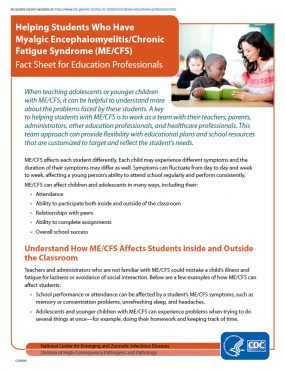ME/CFS in Children: Fact Sheet for Education Professionals
Myalgic encephalomyelitis/chronic fatigue syndrome (ME/CFS) can affect a child’s experience at school. This fact sheet provides information for education professionals such as teachers, guidance counselors, and other school staff about supporting students with ME/CFS and other chronic conditions in the school environment. For the purposes of this fact sheet, adolescents are defined as children between 11 and 18 years old and “parent” refers to adults who are either parents or guardians.
Helping Students Who Have Myalgic Encephalomyelitis/Chronic Fatigue Syndrome (ME/CFS)
When teaching adolescents or younger children with ME/CFS, it can be helpful to understand more about the problems faced by these students. A key to helping students with ME/CFS is to work as a team with their teachers, parents, administrators, other education professionals, and healthcare professionals. This team approach can provide flexibility with educational plans and school resources that are customized to target and reflect the student’s needs.
ME/CFS affects each student differently. Each child may experience different symptoms and the duration of their symptoms may differ as well. Symptoms can fluctuate from day to day and week to week, affecting a young person’s ability to attend school regularly and perform consistently.
ME/CFS can affect children and adolescents in many ways, including their:
- Attendance
- Ability to participate both inside and outside of the classroom
- Relationships with peers
- Ability to complete assignments
- Overall school success
Understand How ME/CFS Affects Students Inside and Outside the Classroom
Teachers and administrators who are not familiar with ME/CFS could mistake a child’s illness and fatigue for laziness or avoidance of social interaction. Below are a few examples of how ME/CFS can affect students:
- School performance or attendance can be affected by a student’s ME/CFS symptoms, such as memory or concentration problems, unrefreshing sleep, and headaches.
- Adolescents and younger children with ME/CFS can experience problems when trying to do several things at once—for example, doing their homework and keeping track of time.
- Many children with ME/CFS experience more severe symptoms in the morning hours and may have trouble getting to school on time or staying alert in the morning at school.
- Children with ME/CFS can have problems with attention, response time, information processing speed, and delayed recall of verbal and visual information.
- Teachers may notice that students with symptoms mentioned above may be able to complete grade-level tasks, but might require more time to do so.
Tips for Teachers and Administrators*
Because ME/CFS is a complex disorder that affects how students learn and participate in school, teachers and administrators may want to be creative in developing strategies to foster an encouraging learning environment for their students with ME/CFS. Teachers and administrators may want to:
- Help students with note taking.
- Give them extended time on exams and assignments.
- Schedule rest periods during class or throughout the day.
- Avoid information overload.
- Be open to combining school and home tutoring.
- Permit students to attend school in shorter periods rather than a full day, as necessary.
- If advised by the student’s doctor, allow students to participate in modified physical education classes, or exempt them from class, if needed.
- Give students an extra set of books to use at home.
- Offer and encourage the use of organizers, schedulers, and other tools for time management.
*NOTE: The list above is not exhaustive. Teachers and administrators may need to explore other strategies to accommodate the particular needs of each individual student with ME/CFS.
- Page last reviewed: July 3, 2017
- Page last updated: October 10, 2017
- Content source:


 ShareCompartir
ShareCompartir
